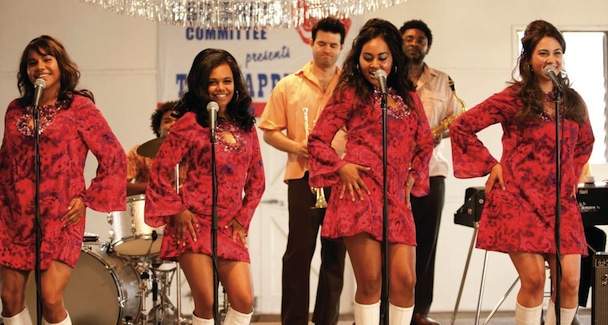The Sapphires
Don't miss the '60s soul sisters making a hit of Muriel's Wedding-esque proportions.
Overview
A shiver shot through me somewhere halfway through The Sapphires. It was the point at which I realised I was watching a film that would go on to be a hit of The Castle- or Muriel's Wedding-esque proportions, an icon of Australiana that we treasure and quote and buy on successive video formats. And it stars four Indigenous women and an Irish guy. This is, we can assuredly say, a bit of a moment.
First-time director Wayne Blair (with Tony Briggs and Keith Thompson scripting and the excellent Warwick Thornton behind the lens) from the get-go crafts a warm, relatable, charmingly mundane world for his Cummeraganja songbirds — protective Gail (Deborah Mailman), brash Cynthia (Miranda Tapsell), and the baby of the group, perfectly aware of her supereminent lung capacity, Julie (Jessica Mauboy). Staring down an inhospitable crowd at a pub talent competition, the sisters do manage to pick up one fan, drifter/pianist Dave (Chris O'Dowd, bona fide Bridesmaids celeb continuing to carve out his niche in adoreableness).
He convinces them to ditch "shite" country music for soul, and they convince him to help them take the next step in their singing career. Recruiting their urbane, fair-skinned cousin Kay (Shari Sebbens), from whom they've long been separated, they prepare to head to Vietnam to entertain the American troops.
The Sapphires is a feelgood film with mainstream sensibilities, so prepare yourself for every kind of musical cliche here, including the Rehearsal Montage (from learning to dance to learning the true meaning of soul) and Winning Arguments by Opening One's Mouth to Sing and Allowing the Purity of One's Talent to Do All the Communicating. That's one thing that got everyone on their feet at Cannes, but it's not the only thing; this is a winningly funny and upbeat flick that also works within its genre limitations in smart ways, and it is ultimately, appropriately, soulful.
It's set in 1968, one year after the Constitution was changed to count Indigenous Australians in the census, three years after the Freedom Rides shone a spotlight on racial segregation in outback towns, and within the period when Aboriginal children were still being forcibly removed from their families. These events flicker behind the girls' personal lives. The characters are presented as archetypical girls next door, but The Sapphires also draws a very nuanced picture of Aboriginality as the girls experience not only prejudice but liberation. Soul music connects them to a movement and allows them self-expression, while their tour to Vietnam — performing to American troops, whose young black men are substantial in number — gives them the opportunity to make an impression for something other than the colour of their skin. It also gives them the opportunity to pursue various romances against the backdrop of Saigon's fading glamour, which they do, with gusto.
Do not let any prejudice you have about Australian movies keep you from seeing The Sapphires; there is nothing parochial about it nor a bum note in the mix. The Sapphires' tune is all about salvaging something sparkling when the situation looks like pure muck, so it's a joyous moment when a recent photo of the four women flashes onto the screen and you're reminded that the story is based on lives really lived. The Sapphires is gorgeous and could prove to be the best iteration yet of the argument that comedy is healing.





